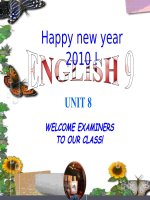ENGLISH 9 W 23 P 43-44 UNIT 7 GETTING STARTED LISTEN & READ SPEAK
Bạn đang xem bản rút gọn của tài liệu. Xem và tải ngay bản đầy đủ của tài liệu tại đây (148.56 KB, 9 trang )
UNIT 7: SAVING ENERGY
I. Objectives:
1. Topic: Saving energy
2.Competences:
Show concern
Giving and responding to suggestions
Seek information. Expressing opinions on saving energy
Preparing a simple speech
3.Skills:
Speaking: - Talk about the problems of energy waste and solutions to the problems
- Make and respond to suggestions
Listening: Listen to monologues / dialogues within 100-120 words for general or
detailed information
Reading: Read passages within 150-180 words for general or detailed information
Writing: Write a passage or a speech within 80-100 words based on frame and idea
cues
4.Language focus:
Connectives: and, but, so, or, therefore, however
Phrasal verbs: turn off, turn on, look for, look after
Suggestions: suggest + V-ing, suggest (that) + S + should
5.Vocabulary: - Words to talk about energy waste problems around students’ life and
solutions to save energy.
II. Unit plan:
Unit 7: Saving energy (6 periods)
Period 1 : Getting started- Listen and read
Period 2: Speak
Period 3: Listen
Period 4: Read
Period 5: Write
Period 6: Language focus
Date of preparing: 30/1/2020
Period 43
UNIT 7 : SAVING ENERGY
LESSON 1 : - Getting started - Listen and read
A.Objectives:
1. Aims: By the end of the lesson, students will be able to understand the dialogue
about the ways to save energy and do the 15-minute test.
2. Practice skill:
- Practice the comprehension reading skill,writing and speaking skill.
3. The knowledge needs to get:
+ Standard knowledge: to use the words and phrases relating to energy saving and
understand the dialogue , the ways to save energy .
+ Advanced knowledge: Answer some questions about the text,Use the structures:
have + sb + V(inf), Get + sb + V( to- inf)
4. Basic language:
- Vocabulary: - water bill, enormous, reduce, plumber, crack, dripping faucet ( n ):
- have + sb + V(inf), Get + sb + V( to- inf), S + should…
5. Attitude:
- Help ss to have good consciousness in order to understand the dialogue about the
ways to save energy.
B. Teaching- aids: Textbook, pictures, posters, Cd, computer.
C. Methods:
- Model-Talk-Practice, individual work, pair work
- Some techniques can be used: Rub out and remember, T/F, Discussion,
comprehension questions,chatting.
D. Procedure :
I.Organization: ( 1 minute)
- Greeting: Good morning!
- Who’s absent today?
Class
Date of teaching
9A
3/2
9B
3/2
9C
3/2
Teacher’s activities
II . WARM UP (4 minutes)
Chatting:
- Have students look at the picture on page 57 ( or
show the picture on the board ) and ask some
questions so that they can understand the picture.
. Is the TV on?
. Who is watching TV?
. Is the light still burning?
. What happens to the faucets?
. Should we turn the TV off?
. Must we pay for water and electricity we use in our
Absent students
Students’ activities
Chatting:
Students look at the picture
on page 57. Answer the qs.
home?
. What should we do to save energy?
-Make a list of things the
family could do to save
energy.
III . NEW LESSON (22minutes)
Step 1. Pre Reading :
1.Vocabulary :
1. ( realia )
- water bill ( n ):
2. ( synonym )
hoá đơn tiền nước
1. Vocabulary :
3. ( translation) - enormous ( adj ):
4. ( picture )
khổng lồ, to lớn
5. ( visual )
- reduce ( v ):
giảm
Sts : - listen.
6. ( picture )
- plumber ( n ):
- listen and repeat
thợ sửa chữa đường nước
- crack ( n ):
vết nứt, gãy (chorally then individually).
- copy.
- dripping faucet ( n ):
vòi nước bị rỉ nhỏ giọt
* Checking vocabulary:Rub out and Remember
- Get students to copy the words in their books.
- Ask students to repeat the words chorally.
Rub out the words one a time. Each time you rub out
an English word but leave the Vietnamese
translation.
- When all the English words are rubbed out, go
through the Vietnamese list and get students to call
out the English equivalent.
- Get students to come to the board and write the
English words again.
- Check and focus on the spelling.
2. T/ F statements prediction
- Set the scene: Mrs. Ha is talking to his neighbor,
Mrs. Ha and Mrs. Ha looks very worried.
Now, work in pairs and guess about the
conservation between them.
- Hang the poster of statements on the board and ask
students to guess which statements are true and
which are false.
2. True or False :
a. Mrs. Ha is worried about
his water bill.
b. Mrs. Mi gives Mr. Ha
advice on how to save
water.
c. Mrs. Ha has checked the
pipes in her house and
found no cracks.
d. A plumber is a person
who repairs electric
appliances.
e. Mrs My suggests taking
showers because they can
save water.
Answer Key :
a. T
Step 3. While Reading :
1. Reading and checking prediction
- Ask students to read the dialogue on page 57 and
check their prediction.
Have students correct false statements.
2. Comprehension Questions :
- Have students work in pairs to finds out the
answers of these questions.
- Give feedback. Call on some students to answer the
questions. Teacher checks and writes the answers on
the board if necessary.
- Ask students to work in open pairs ( some pairs of
students practice asking and answering before the
class ).
- Have students work in closed pairs.
* Answer keys:
a. Because his recent water bill is enormous.
b. He pays 200.000 dongs.
c. She advises Ha to get a plumber to check her
water pipes and reduce the amount of water by
taking shower and turning off faucets after use.
d. A dripping faucet can waste 500 liters of water a
month.
Step 3. Post Reading :
Discussion:
- Ask students to work in groups, discussing the
topic: ... * Possible answers:
Saving energy at school and at home.
+ taking a shower instead of a bath.
+ turning off faucets after use.
+ making sure there are no cracks in the water pipes.
+ turning off lights before leaving.
+ turning off TV, radio when none watch or listen
IV . SUMMARY (1 minutes)
- Reading about saving water.
V . HOMEWORK (2 minutes)
- Write 5 things you should do to save energy at
home and at school.
-Prepare the next lesson: Speak
b. T
c. F Mr. Ha hasn’t
checked the
pipes in his house.
d. F A plumber is a
person who
repairs water pipes.
e. T
3. Questions :
a. Why is Mrs. Ha worried?
b. How much money does
Mrs.
Ha pay for her water bill?
c. What does Mrs. Mi
advise Mrs.
Ha to do?
d. How much water can be
wasted
a month by a dripping
faucet?
4. Discussion:
What do you do to save
energy at home and at
school ?
5. Homework :
Write 5 things to save
energy at home and at
school.
*. Evaluation :
.......................................................................................................................................
.......................................................................................................................................
.......................................................................................................................................
.........................................................................................................................................
Date of preparing: 30/1/2020
Period 44
UNIT 7 : SAVING ENERGY
LESSON 2 : Speak
A.Objectives:
1. Aims: By the end of the lesson, students will be able to make and respond to
suggestions.
2. Practice skill:
- Practice speaking skill.
3. The knowledge needs to get:
+ Standard knowledge: Make and respond to suggestions.
+ Advanced knowledge: Give and respond to suggestions well.
4. Basic language:
- Vocabulary: fan, air conditioner, instead of.
- Structure:
- I suggest + V - ing ..
- OK.
- I think we should...
- That’s a good ideas.
- Shall we ....?
- All right.
- Why don’t we ...?
- Let’s
- How about + V-ing ..?
- No. I don’t want to.
- Let’s + infinitive
- I prefer to..
5. Attitude:
- Help ss to have good consciousness in order to practice speaking about how to
save energy.
B. Teaching- aids: Textbook, pictures, posters.
C. Methods:
- Model-Talk-Practice, individual work, pair work
- Some techniques can be used: Kim’s game, Discussion.
D. Procedure :
I.Organization: ( 1 minute)
- Greeting: Good morning!
- Who’s absent today?
Class
Date of teaching
Absent students
9A
7/2
9B
7/2
9C
7/2
Teacher’s activities
Students’ activities
II. WARM UP (4 minutes)
Chatting: When should we save energy?
When using means of transport, using water, using
electricity.
(Kim’s game:
- Have students look at the poster of things dealing
* Answer:
with activities in free time ( for 20 seconds ) on page 1 - go to the movies.
59 and try to remember as many activities as possible. 2 - play badminton.
- Divide the class into 2 groups.
- Put away the posters and ask students to go to the
board and write the names of the activities they’ve
just seen from memory. The group having the most
right English words is the winner.)
III. NEW LESSON (35minutes)
Step 1 : Presentation :
- Elicit from students to draw the exchange. ...
- Asking students to find out other ways of making
suggestions.
+ I think you should take a shower.
+ Why don’t you take a shower?
+ How about taking a shower?
+ What about taking a shower?
Step 2: Practice :
- Have students do exercise 3a on page 58 - 59.
- Ask students to look at the pictures on page 59 and
the tables on page 58 and make reponses to the
suggestions ( or use picture cue drill ) ....
b. Shall we turn down the gas fire ?
OK. Let's .
c. Why don't we turn off the fan ?There is nobody in .
That's a good idea .
d. How about turning off the air conditioner ?There 's
nobody in .
All right .
e. What about turning off the lights. There 's nobody
in.
All right.
f. Oh, it's flooding. Let's turn off the faucet .
Yes, let's.
g. I think we should go by bicycle to save the energy .
No, I don't want to. I prefer to go by motorcycle .
3 - watch TV
4 - play chess.
5 - do homework.
6 - read books/ go to the
library.
7 - go skiing/ ski.
8 - play games.
1. Grammar :
Eg :
- I suggest taking a shower.
- OK. I’ll do that.
* Form:
Sugestions
- I suggest + V ing ...
- I think we should...
- Shall we ....?
- Why don’t we ...?
- How about + Ving ..?
- Let’s + infinitive
Response
- OK.
- That’s a good ideas.
- All right.
- Let’s
- No. I don’t want to.
- I prefer to..
2. Speak :
* Speak a :
Example:
- I think we should turn off
the faucet .
- I suggest fixing the faucet .
h. I suggest going by bus. It's cheap. We can save
money .
That's a good idea .
- Have students work in open pairs then closed pairs.
* Further practice:
- Ask students to do exercise 3b on page 59.
- Get students to look at the pictures on page 59 and
make suggestions about how to save energyat home.
Students work in pairs and write down as many
sentences as possible. Which pair writing most
sentences gets good marks.
Step 3 : Production :
Discussion:
- Remind students that after suggest we can use a “
that clause”.
- Divide the class into two groups. Group A discuss
the topic in 3a on page 64 “what you do to help the
poor in the neighborhood of your school” using the
structure “ suggest + V - ing”. Group B discuss the
topic 3b on page 64 “giving suggestions that help
your friend to improve his/ her English”, using the
structure “suggest + that clause”
a. Possible answers:
+ Collect some money.
+ Collect unused clothes.
+ Organized a show to raise money.
+ Give lessons to poor children.
+ Help poor families with their chores.
+ Gives poor children books, notebooks and school
things...
b. Possible answers:
+Work harder on your pronunciation
+ Speak English in class.
+ Buy a goos dictionary.
+ Do some reading every day.
* Speak b :
Answers:
+ I think we should turn off
the
faucets after use.
+ I suggest fixing the faucets.
+ Why don’t we turn off the
lights
before leaving rooms?
+ How about taking a shower
instead
of a bath.
+ Let’s turn off TV when
noone
watches.
+ I suggest putting the lid on
the
cooking pot when cooking.
3. Language Focus 3 :
a. Suggest + V - ing
What do you do to help the
poor in the neighborhood of
your school ?
Ex: I suggest collecting some
money.
b. Suggest + that clause
Giving suggestions that help
your friend to improve his/
her English.
Ex: I suggest ( that ) you
should work harder on your
pronunciation.
+ Write new vocabulary on small pieces of paper
and stick everywhere in your home.
+ Write diary in English.
- Ask a volunteer from each group to show their ideas
before class.
- Give feedback.
IV. SUMMARY (1 minutes)
- Practice making and responding to suggestions and
further practice in making suggestions.
EX 5. (P 69 EX book 9): What do you
suggest to the following people?
Suggested answers:
a. I suggest (that) they should have
some ginger tea / some aspirin.
b. I suggest (that) he should have a
plumber repair it.
I suggest (that) he should have it
repaired by a plumber.
c. I suggest (that) they should tum the
lights off when they leave.
d. I suggest (that) she should travel by
bike.
I suggest (that) she should use less
motorcycle.
4. Homework :
-Students to write what
they’ve discussed in their
V. HOMEWORK (2 minutes)
notebooks.
- Ask students to write what they’ve discussed in their -Prepare the next lesson:
notebooks.
Listen
-Prepare the next lesson: Listen
I suggest (that) she should have her
motorcycle / it serviced.
* Evaluation :
.......................................................................................................................................
.......................................................................................................................................
.......................................................................................................................................
.......................................................................................................................................
.......................................................................................................................................
.......................................................................................................................................









